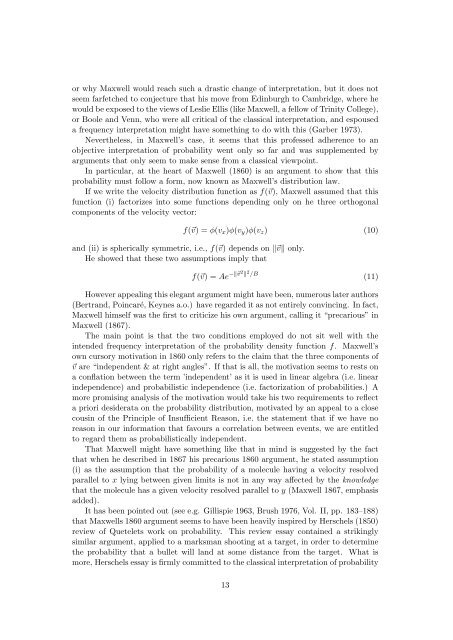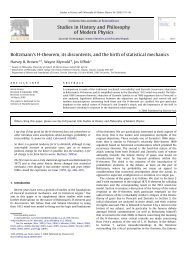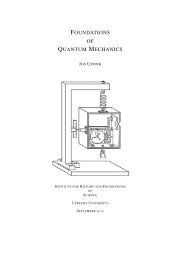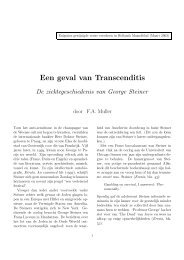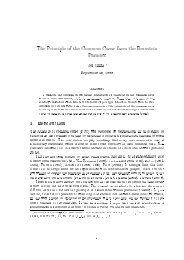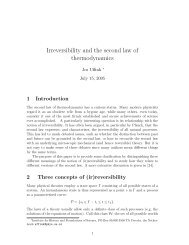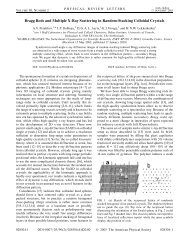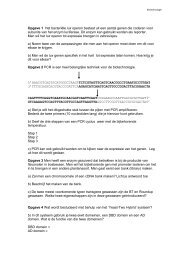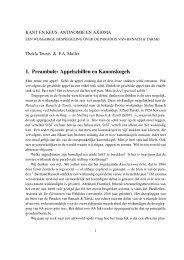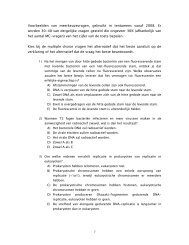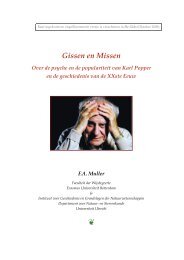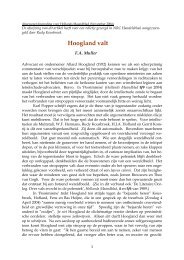Subjective probability and statistical physics
Subjective probability and statistical physics
Subjective probability and statistical physics
You also want an ePaper? Increase the reach of your titles
YUMPU automatically turns print PDFs into web optimized ePapers that Google loves.
or why Maxwell would reach such a drastic change of interpretation, but it does not<br />
seem farfetched to conjecture that his move from Edinburgh to Cambridge, where he<br />
would be exposed to the views of Leslie Ellis (like Maxwell, a fellow of Trinity College),<br />
or Boole <strong>and</strong> Venn, who were all critical of the classical interpretation, <strong>and</strong> espoused<br />
a frequency interpretation might have something to do with this (Garber 1973).<br />
Nevertheless, in Maxwell’s case, it seems that this professed adherence to an<br />
objective interpretation of <strong>probability</strong> went only so far <strong>and</strong> was supplemented by<br />
arguments that only seem to make sense from a classical viewpoint.<br />
In particular, at the heart of Maxwell (1860) is an argument to show that this<br />
<strong>probability</strong> must follow a form, now known as Maxwell’s distribution law.<br />
If we write the velocity distribution function as f(⃗v), Maxwell assumed that this<br />
function (i) factorizes into some functions depending only on he three orthogonal<br />
components of the velocity vector:<br />
f(⃗v) = φ(v x )φ(v y )φ(v z ) (10)<br />
<strong>and</strong> (ii) is spherically symmetric, i.e., f(⃗v) depends on ‖⃗v‖ only.<br />
He showed that these two assumptions imply that<br />
f(⃗v) = Ae −‖⃗v2 ‖ 2 /B<br />
(11)<br />
However appealing this elegant argument might have been, numerous later authors<br />
(Bertr<strong>and</strong>, Poincaré, Keynes a.o.) have regarded it as not entirely convincing. In fact,<br />
Maxwell himself was the first to criticize his own argument, calling it “precarious” in<br />
Maxwell (1867).<br />
The main point is that the two conditions employed do not sit well with the<br />
intended frequency interpretation of the <strong>probability</strong> density function f. Maxwell’s<br />
own cursory motivation in 1860 only refers to the claim that the three components of<br />
⃗v are “independent & at right angles”. If that is all, the motivation seems to rests on<br />
a conflation between the term ’independent’ as it is used in linear algebra (i.e. linear<br />
independence) <strong>and</strong> probabilistic independence (i.e. factorization of probabilities.) A<br />
more promising analysis of the motivation would take his two requirements to reflect<br />
a priori desiderata on the <strong>probability</strong> distribution, motivated by an appeal to a close<br />
cousin of the Principle of Insufficient Reason, i.e. the statement that if we have no<br />
reason in our information that favours a correlation between events, we are entitled<br />
to regard them as probabilistically independent.<br />
That Maxwell might have something like that in mind is suggested by the fact<br />
that when he described in 1867 his precarious 1860 argument, he stated assumption<br />
(i) as the assumption that the <strong>probability</strong> of a molecule having a velocity resolved<br />
parallel to x lying between given limits is not in any way affected by the knowledge<br />
that the molecule has a given velocity resolved parallel to y (Maxwell 1867, emphasis<br />
added).<br />
It has been pointed out (see e.g. Gillispie 1963, Brush 1976, Vol. II, pp. 183–188)<br />
that Maxwells 1860 argument seems to have been heavily inspired by Herschels (1850)<br />
review of Quetelets work on <strong>probability</strong>. This review essay contained a strikingly<br />
similar argument, applied to a marksman shooting at a target, in order to determine<br />
the <strong>probability</strong> that a bullet will l<strong>and</strong> at some distance from the target. What is<br />
more, Herschels essay is firmly committed to the classical interpretation of <strong>probability</strong><br />
13


